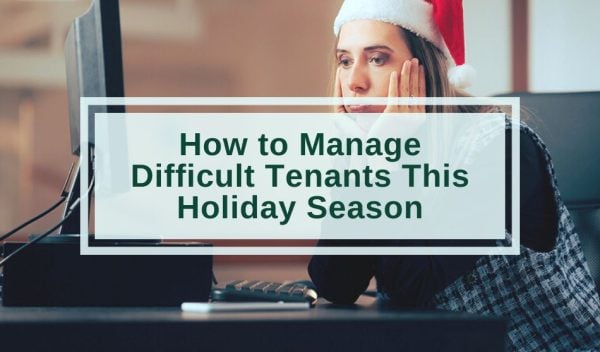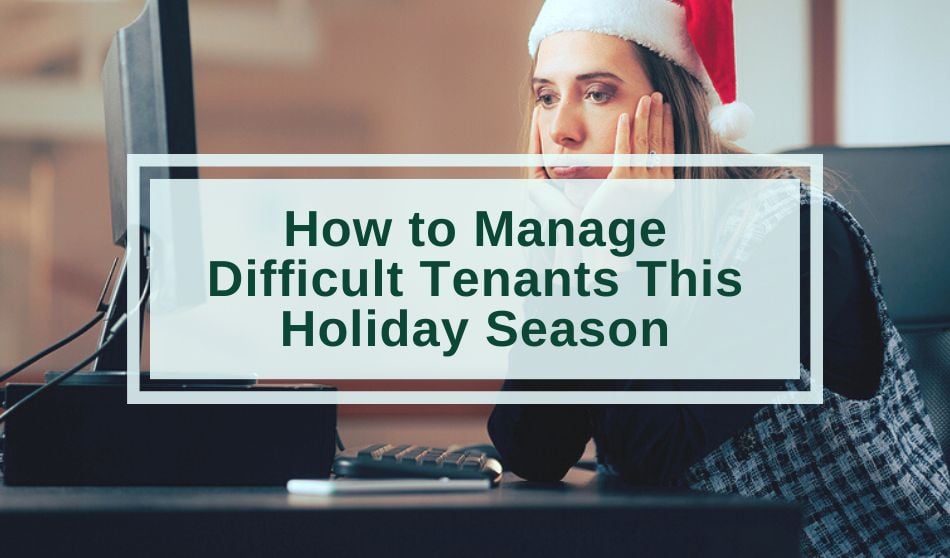
As the temperatures drop and holiday music follows you wherever you go, there is no doubt the holiday season is in full swing. While this time is enchanting, it can also be incredibly stressful as financial burdens often arise post-holidays.
Last-minute holiday shopping, if not budgeted correctly, can impact a person’s everyday expenses – sometimes making them fall short on bills like rent. According to the 2019 American Community Survey, more than 44 million households in the United States are renters. Missed or late rent payments can cause serious problems for landlords because many depend on a tenant’s monthly payment to continue property operations. Unfortunately, this can become more common in the months during and after the holiday season.
A difficult tenant is defined as a person who fails to meet the expectations outlined for them in the lease agreement. Whether your tenant is late on rent, causes damage to the home during the holiday season, or fails to pay completely, below are some options for what the landlord can do to alleviate the scenario.
Practice Open Communication
A landlord must be transparent about what they want the tenant to do – whether that is having them restore the property due to damage, pay their rent as soon as possible, or asking them to move out. Sometimes, the most direct way is the easiest way, and at least then, all parties are aware of expectations. This way, arrangements can be made, and both perspectives are clearly explained to all involved.
Landlords should be sure to outline the negative consequences of disobeying the lease and nonpayment of rent. One of the most significant consequences a tenant can face is the impact of eviction, and tenants must remember that they are still responsible for missed rent payments even after the eviction process occurs. Missed rent can be sent to collections which could have an impact on a tenant’s credit report. The credit score is a huge determining factor in whether a tenant will be able to make large investments in the future or save for long-term goals. For instance, if a tenant plans to buy a house after their renting period is over, they will need to know what credit score is needed to buy a house and be in good financial standing.
A tenant’s credit score and eviction history can also be a tenant screening factor if they decide to apply for another rental property. Communicating this along with other repercussions from missing rent or other issues, can help the tenant understand the consequences of these actions on their future, and help resolve these conflicts.
Consider Waiving Late Fees
Every now and then, you’ll run into a good tenant who just had a bad month. And given the circumstances of the holiday season, it may be that they overlooked their budget in December. In some situations, the landlord can negotiate with the tenant, given good communication, and offer some concessions to help the tenant through the holiday season, like waiving late fees. This trust can be granted by looking at the tenant’s previous payment history and determining if their history makes them eligible for such leniency. If the tenant is consistently paying their rent on time, as a landlord, you may find it in your heart to grant the tenant some grace. This option can be easier for a landlord, given that other measures can be more time-consuming and expensive.
When to Consider Eviction
If a tenant is consistently not paying, or violating their lease, more serious actions can be taken. Many tenants think they are absolved from punishment due to the time of year, but evictions can still take place even during the holiday season. It must be noted that evicting a tenant should be a last resort as it is often the most expensive and time-consuming option. A landlord should have tried other options before going through with the eviction process. To get a stubborn tenant to move out, a landlord can even offer incentives like payment to not have to file for eviction. This is often referred to as “cash for keys” and can be beneficial for the landlord and tenant alike.
Learn more: What is Cash for Keys for Rental Properties?
If all avenues have been exhausted, then it can be time to file for an eviction. As a landlord, you must be familiar with the eviction requirements and laws in your area. While some states may allow eviction for other reasons, most states only allow eviction for one of these three reasons:
- Failure to pay their rent
- Failure to move out once their lease ended
- Violation of the lease terms
The eviction process varies by state, so a landlord must ensure they are going through with the process in a legal manner and all rental laws are adhered to. This will ensure that the landlord can fully reap the benefits of the eviction and win the case.
Final Thoughts
The joyful time of year can makes decisions such as eviction all that more challenging. This means it is vital for landlords and property managers to use their best judgment. Not every tenant deserves extra consideration when it comes to missed or late rent payments, especially if this has been a common trend for the tenant. It is a landlord’s job to take action when situations like these occur to make sure their rental business does not experience any negative consequences.
However, due to the nature of this time of year, a landlord can use their best judgment to determine if the tenant is deserving of a break during the hard times of the holiday season. All in all, a landlord must remember that good tenants are hard to find, and long-term benefits can come with retention.







Kaycee, you wrote an excellent post! Dealing with bad renters is a challenging task for landlords. Thus tenant screening is essential. In addition, steps such as adopting a professionally prepared lease agreement, making it simple to pay their rent by eliminating late penalties, and choosing Renter’s insurance will also assist you in overcoming the issues that come with dealing with bad tenants.